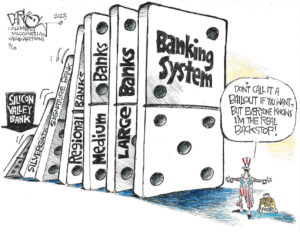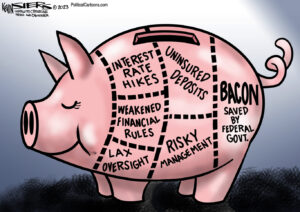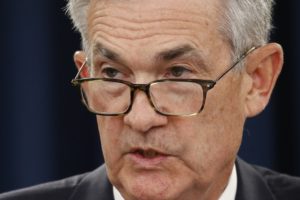Harry and Louise Need Health Reform
Remember the imaginary couple who appeared in the television ads that helped beat President Clinton's health plan 15 years ago? That duo and the corporations behind them have switched sides in the debate, and for a good reason: 50 million new customers.Fifty million new customers.
Those may be the most important words to remember as the health care reform effort hits its stride this week.
Many have expressed amazement that the interest groups historically opposed to fixing the health system seem ready to work with the reformers. Their public-spiritedness reflects enlightened self-interest: The health system is so unstable that even the drug industry and the insurance companies are worried that it will crash on top of them.
Health care reform could bail out these interests by adding the currently uninsured — fast approaching 50 million people — to their customer base, and by preventing more individuals and employers from dropping insurance altogether.
Remember Harry and Louise, the imaginary couple who appeared in the television ads that helped beat President Clinton’s health plan 15 years ago? That middle-class duo, which is to say a great many people just like them, has switched sides in the debate. The insurance companies and the drug companies that paid for the ads know that Louise’s employer has probably restricted her health coverage or dropped her altogether. And who knows if Harry still has a job?
Chris Jennings, who was a senior adviser on health issues in the Clinton administration, says that all participants in the health care system see a vicious cycle at work unless government intervenes. It involves “more and more uninsured, which means more and more premium increases, which means more uninsured, which means more premium increases.”
From the point of view of the interest groups, he adds, “that means less market share for the insurance companies, more uncompensated care by the providers, and less ability for people to afford high-cost prescription drugs.”
Are you still wondering why the big interests, so far at least, are playing ball with congressional health reformers and the Obama administration? Leaders of the health industry know that unless more government money flows into the system, they will suffer along with everyone else.
The banking and auto sectors will eventually have to live without government bailouts. But the experience of every other wealthy democracy in the world shows that health systems require large-scale government support. The drift toward reform in the United States marks the gradual acceptance of that idea in the one democracy that — despite the important role played by Medicare and Medicaid — has resisted it for so long.
That explains why Congress is moving with unusual speed. Sen. Edward M. Kennedy, who chairs the Health, Education, Labor and Pensions Committee, put out his own draft bill last week aimed at pushing progressive ideas on cost containment and a strong government role. Sen. Max Baucus, the chairman of the Finance Committee, is expected to issue the outlines of a plan within a couple of weeks that he hopes will appeal to at least five to seven Republican senators.
The conventional view, true as far as it goes, is that the big sticking points are whether a final bill should include a government-sponsored health plan in the menu of choices that consumers will be given (I believe it should), and how to pay for expanded coverage.
But the toughest behind-the-scenes battles will be about how much the insurance companies, the drug companies and the providers are willing to give up to get a government bailout of the health system. That was the significance of a little-noticed line in President Obama’s letter last week to Kennedy and Baucus outlining his own goals in the bill.
Obama wrote that “reform cannot mean focusing on expanded coverage alone.” The president stressed that it also had to be about “a serious, sustained effort to reduce the growth rate of health care costs.”
That sounds like boilerplate. It isn’t. The hardest part of the health care fight, says Ralph Neas, the CEO of the National Coalition on Health Care, may not be providing assistance for the uninsured — remember, that means expanding the customer base — but getting all the players to agree to serious cost controls. Neas’ coalition includes both business and labor, both of which have been hit hard by spiraling health costs.
So by all means let’s welcome the drug and insurance companies to the health care bargaining table. But let’s also remember that they are sitting at that table as a matter of urgent necessity. Negotiators should bear in mind that health care reform is as vital for them as it is for the now underinsured Harry and Louise.
E.J. Dionne’s e-mail address is ejdionne(at)washpost.com.
© 2009, Washington Post Writers Group
Your support matters…Independent journalism is under threat and overshadowed by heavily funded mainstream media.
You can help level the playing field. Become a member.
Your tax-deductible contribution keeps us digging beneath the headlines to give you thought-provoking, investigative reporting and analysis that unearths what's really happening- without compromise.
Give today to support our courageous, independent journalists.




You need to be a supporter to comment.
There are currently no responses to this article.
Be the first to respond.